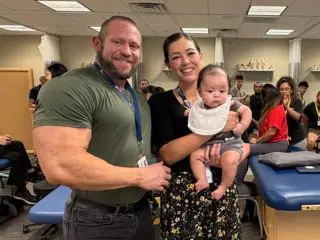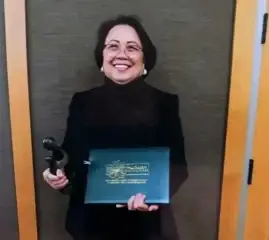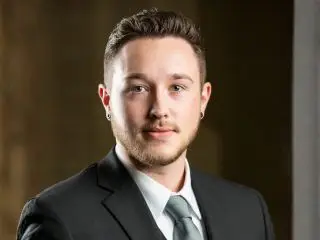Benson Bradley knows what it feels like to want more.
When he was only 17, he left his family and friends in Detroit after his junior year of high school to attend a special U.S. Army Reserve basic training summer program at Fort Jackson, South Carolina. At the end of the summer, Bradley returned home to Michigan to complete his senior year.
That jump-start on his career—and his life—paid off for Bradley. After graduating high school, he began training in the Army Reserves for his Surgical Technology certificate at Fort Sam Houston in Texas and Fort Leavenworth in Kansas. By the time he was 20, Bradley was working as a Surgical Technologist at a medical center in Atlanta.
A lot has changed for Bradley since then. He worked as a certified Surgical Technologist and Surgical First Assistant for 26 years and simultaneously served in the Army Reserves for 15 years. He has been as a college department chair and was a campus coordinator at Georgia State University in Decatur. He served as a board member and a two-term president of the Georgia State Assembly Association of Surgical Technologists. Bradley has also held a number of leadership roles in the national professional organization, the Association of Surgical Technologists (AST), for more than 10 years. In 2019, he was awarded the organization’s prestigious Fellow of the Association of Surgical Technologists (F.A.S.T.) designation at their 50th Anniversary conference.
Along the way, Bradley also found time to complete his Master of Divinity and Master of Business Administration degrees. He’s currently studying for his doctorate in Organizational Leadership in Healthcare Administration.
One thing that clearly hasn’t changed over the years is Bradley’s passion for growth—for himself and for others. He recently joined Carrington College as program director and instructor for the new Surgical Technology program on the Phoenix campus. (Carrington also offers the program on the San Jose campus.) Returning to the classroom is something of a full-circle moment for Bradley.
“Having worked in the Surgical Technology arena for much of my career, I’m committed to helping students pursue a path that I’ve personally found very rewarding,” Bradley says. “Our program prepares students to become frontline health professionals who work alongside and across from surgeons in the operating room. They learn to be responsible for maintaining sterility in the operating rooms, preparing instruments and equipment for surgery, and anticipating the needs of surgeons during surgery.”
The 64-week program is divided into four 16-week terms. The inaugural class on the Phoenix campus begins June 22. Each cohort will have up to 18 students, and Bradley expects the program will soon have three cohorts progressing simultaneously. When students graduate, they’re prepared to sit for the national certification exam. Upon completing that certification, they’re qualified to work as Surgical Technologists in hospitals, surgical centers, and doctor’s offices.
In addition to serving as program director, Bradley will also be teaching. He says his memories of life as a student have directly influenced the kind of teacher he strives to be.
“Unfortunately, my introduction to surgical technology was with teachers who were less effective in the classroom than they were in the operating room,” Bradley recalls. “I didn’t feel that I had been well-taught, so I was insecure when I first began working. But good lessons can result from bad experiences. I was very fortunate to work with surgeons and staff who took me under their wing and mentored and guided me. They were determined to help make me better, and they did. Within a year, I was working as a lead neurological technologist. Having people who believed in me made all the difference.”
For six years, Bradley also worked as a chaplain in the U.S. Army Reserves in Atlanta. He says that experience underscores his core belief that it’s essential for students to think of patients as people rather than procedures.
“I don’t know that you can teach compassion, but I do believe you can provide students with training that teaches the power of empathy,” Bradley says. “No matter how busy you are or much pressure you feel on a given day, it’s important to remember that patients are human beings and not just names on a list. While it can be easy to think of a patient as ‘the gallbladder in room 728’, it’s always better to see that patient as a person first.”
As Bradley prepares to launch Carrington’s Surgical Technology program in Phoenix, he says he can’t help but remember his own experience as a Surgical Technology student.
“I know what it feels like when you first commit to a program like ours,” he says. “Whether a student is returning to college after decades in another career or starting right out of high school like I did, it can be intimidating. That can be especially true for older students, who are often working and raising a family while going to school. Part of my job is to help students rise up and meet whatever challenges they face along the way.”
Bradley, the father of three children ranging from ages 17 to 26, says he wants the same thing for his students that he wants for his own kids.
“I want to see them get better, be better, and do better,” says Bradley. “My parents and my brothers have always been a rock-solid support system for me. Not everyone is lucky enough to have that, so I do my best to provide that encouragement whenever I can. I want to help our students get the education and develop the skills they need to pursue a life and career of purpose. Students who graduate with a Surgical Technology degree make a difference because they’re doing a job that literally helps improve and save lives every day.”



